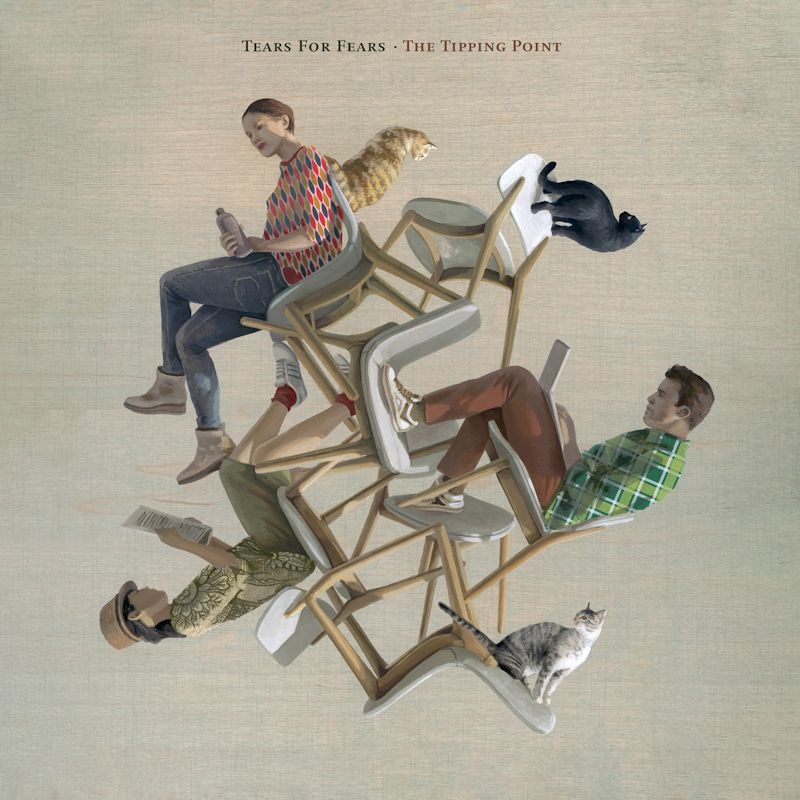On "The Tipping Point", Tears For Fears reminds us that even pain can beget grace
by Andrew Carr
2022-03-07

Tears for Fears has always had a close relationship with mental anguish. Roland Orzabal and Curt Smith adopted the symbol of the “Big Chair” for their second album, a reference to the U.K. miniseries Sybil about a woman undergoing psychotherapy. The duo evolved beyond the themes of anguish and mental illness for the following years, seemingly coming to a quiet stop with 2004’s Everybody Loves a Happy Ending. With the release of The Tipping Point, not only have Orzabal and Smith made a stunning comeback, it’s also never felt closer to the Big Chair.
The Tipping Point is, impressively, both a product of its time and a product of its legacy. The duo’s musical touch has plainly evolved since their last work together, and it feels like most of the songs fit right in among any other radio tune. However, these new tracks still manage to feel like they could have been included in Songs From The Big Chair or The Seeds Of Love. Orzabal and Smith return to their roots in synthesizer-heavy tracks, while still incorporating classical instruments. Fans of old Tears for Fears may find the use of synthesizers somewhat disappointing; they don’t take as much of a forward stance as in previous albums, often serving just to accompany physical guitar riffs and piano flourishes. Indeed, some songs like “Break The Man” feel very basic and indistinguishable from the wider pool of music today. There is still much to enjoy here, though, as those same synthesizers are implemented in a novel and more somber way compared to previous works. The Tipping Point offers a novel, yet still recognizable face to the band.
The songs have also evolved emotionally while still staying rooted in the classic themes of Tears for Fears’ first two albums: the “hurting” from childhood has been left behind, and Orzabal and Smith now face the “hurting” which plagues adult life. The album deals largely with dementia, the loss of a loved one to the disease, and the guilt associated with witnessing it. Songs like “The Tipping Point,” “My Demons,” “Please Be Happy,” and “Stay” deal directly with Orzabal’s own struggles with his late wife’s mental deterioration. As such, the album is quite the tearjerker; “Please Be Happy” is a heartrending funeral song, and an introspective and self-critical feeling fills the remaining tracks.
The high point of the album arrives about halfway through, with the drastic swing from the high-energy, dance-floor tune “My Demons” to the much more somber and reserved tracks “Rivers of Mercy” and “Please Be Happy.” It evokes the feeling of wildly smashing a mirror, only to stare emptily at the millions of damned reflections the shards create. These three songs feel like the heart of the album, the raison d’être. The very name of the group is rooted in “primal therapy,” wherein trauma and strong emotions are directly and violently confronted. In confronting Orzabal’s anguish dealing with his wife’s crumbling mental state, the stage name has never been more prominent. Going over the tipping point, ten new songs are born; with the ten new songs, ten old fears are brought to light; for the ten old fears, ten fresh tears are shed.
In all, The Tipping Point may not be quite as strong as the legacy-defining Songs From The Big Chair or even its follow-up, The Seeds Of Love, but it is definitely a very special album that can stand tall and proud amongst its predecessors. This may be the end of their careers, one last reminder that “life is crazy, then it all turns to dust,” that even adults have it rough, or it could be the start to a whole new journey into the future, to “please explain The Hurting.” In any case, it is nice to hear from Orzabal and Smith once more.
